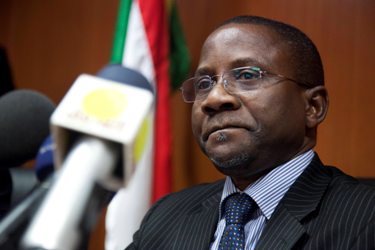UN expert says was unable to inspect human rights situation in Darfur
June 14, 2012 (KHARTOUM) — Sudanese government declined a request by the UN Independent Expert on the situation of human rights in the Sudan, Mashood Adebayo Baderin, to visit Darfur region, in his first visit to the country.

In his latest report, the former expert Mohamed Chande Othman, said alarmed by the “precarious” situation of human rights in Darfur. He further said Khartoum did not take any significant steps towards the implementation of most of the recommendations of the Group of Experts on Darfur since his previous report.
However, the Human Right Council in September 2011, praised the peaceful independence of South Sudan and the signing of Darfur peace agreement, and decided to encourage Khartoum to improve the human rights situation despite the start of another conflict in South Kordofan and Blue Nile.
In a press conference held at the ministry of justice in Khartoum on Thursday, Baderin said he applied for a permission to visit Darfur region but Sudanese authorities told him that the time limit “was short to make the arrangements”.
The independent expert pointed out that Sudanese officials assured him that the situation has improved in the region. However he added that “other stakeholders” he met provided him with a different picture of the situation in Darfur.
But he underlined it was difficult to make his own conclusions based on those statements.
Since the singing of Darfur peace document, the government says violence against civilians and tribal attacks are under control. Khartoum further emphasizes on the voluntary return of displaced civilians to their areas and urges international support for recovery and development projects.
On the other hand, rebel groups who were during a year outside the region, in South Kordofan and allegedly in South Sudan, resumed attacks in North and South Darfur states. As they now call for regime change and refuse talks on Darfur issue.
Rights activists accuse the security organs of arbitrary arrests and torture among IDPs and civilians but the government says preventing as anti-peace elements to impede peace implementation in Darfur.
Baderin went to hint to a disagreement between him and the Sudanese authorities about the nature of his mandate saying Khartoum considers that his mission is limited to provide technical assistance and capacity building.
Last year Sudan backed by African, Arab, and Islamic groups the Council, rejected demands by Western countries and right groups to extend the mandate of the independent expert arguing it would be better equipped to deal with their human rights issues themselves if Khartoum was provided with technical support.
The expert who will present a report to the UN Human Rights Council in September further expressed concerns about press freedom in Sudan.
He said received reports about censorship, closure of some newspapers houses ad arrest of journalists as well as confiscation of newspapers. He added that he discussed the issue with the Sudanese officials.
Baderin called on the Sudanese government to speed up the reforms of law specially, the Criminal Code and Civil Procedure. He also urged Khartoum to address the human rights situation in Darfur, South Kordofan and Blue Nile, and to grant nationality to South Sudanese.
He also said that the Sudanese government has initiated some steps necessary to deal with the recommendations of the Human Rights Council. But insisted on the need to establish an independent human rights body.
Stressing that he discussed with the Sudanese officials the need to enforce the recommendations endorsed by the Human Rights Council before to receive the technical assistance.
Last year Amnesty International, reacting to the Council decision on the technical assistance, regretted that the resolution failed to recognize “the severity of persistent and ongoing human rights violations in Sudan and in that regard is wholly inadequate.”
The rights group since September 2011 underscored the human rights violations and denial of humanitarian access to aid workers in South Korodfan and Blue Nile. Amnesty went further to demand that the expert should report about the human rights and humanitarian situation in the two southern Sudanese regions.
Baderin declined, in his press conference to speak about the situation in South Kordofan and Blue Nile indicating he did not ask to visit these states due to the security situation.
(ST)
